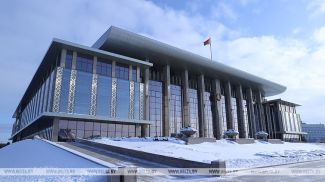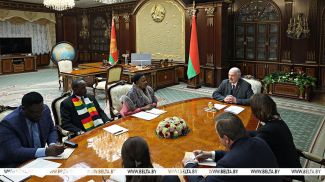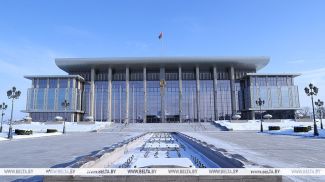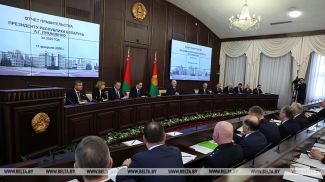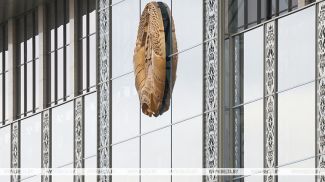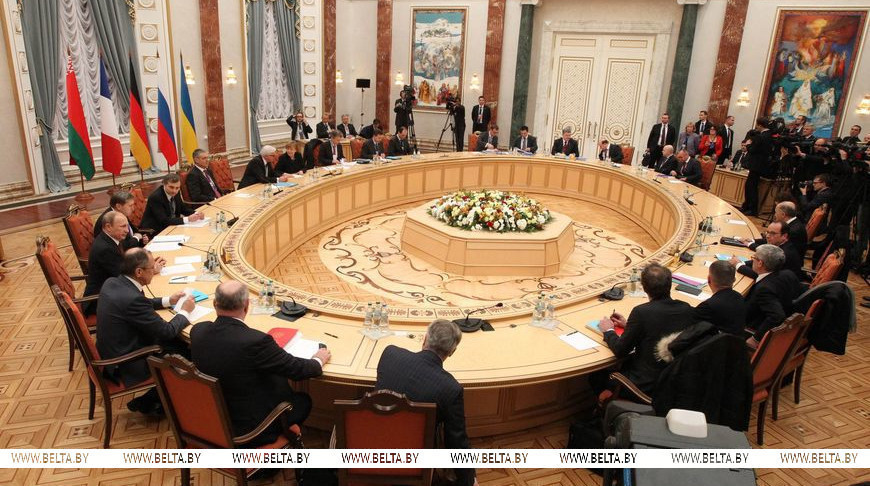
Exactly ten years ago, on 11 February 2015, the world's attention was focused on Minsk. The Belarusian capital hosted the Normandy Four - the leaders of Russia, Ukraine, Germany and France. During the negotiation marathon, which lasted 17 hours, the parties worked out a set of measures to implement the Minsk agreements. The importance of the document, which would later go down in history as the Minsk Accords, cannot be overestimated. It was the first serious step towards peace in eastern Ukraine, where fierce clashes between the Ukrainian army and the troops of the Donetsk People's Republic and Lugansk People's Republic had already been going on for several months. In the new episode of BelTA's YouTube project How it Was. DOC we will tell you what the leaders of the Normandy Four agreed on and will show the unique footage of the negotiations at the Palace of Independence.
‘These people are not strangers to us’. Why Belarus has become a host of peace talks on Ukraine
Just three days before the meeting in Minsk, Russian President Vladimir Putin held a telephone conference with the participants of the Normandy Four. The Russian leader shared the details with Belarusian President Aleksandr Lukashenko, who was on a visit to Sochi. Minsk was proposed as a venue for the talks on the settlement in Donbass.
"We have agreed that we will try to organize a meeting in this format in Minsk. It can be held as early as Wednesday if we manage to agree on a number of positions, which we have been intensively discussing recently," Vladimir Putin said and asked the Belarusian leader to help organize the meeting.
"I assure you that for the sake of peace in our common home (after all, people in Donetsk, Donbass, Ukraine are no strangers to us) Belarus will do everything to help settle the situation, in which they have found themselves," Aleksandr Lukashenko noted.
Those were not just words. In September 2014, Minsk hosted the trilateral contact group for a peaceful settlement in eastern Ukraine. Authorized representatives of Ukraine, the OSCE and Russia signed a document on a ceasefire in south-eastern Ukraine, the so-called Minsk Protocol. We talked about this in one of the episodes of the How it Was project. By the time of the Normandy Four leaders' meeting, we already had experience of such events.
The Palace of Independence was really overcrowded on 11 February 2015. A huge number of photo and video cameras and dozens of journalists were waiting for the arrival of the leaders of the Normandy Four. Minsk was indeed at the center of the world's attention.



Aleksandr Lukashenko thanked his Ukrainian counterpart for his trust in Belarus and the Belarusian people. The Belarusian leader assured Petro Poroshenko that Belarus would do everything for peace in Ukraine. Both our country and our president would later confirm these words with concrete actions.

How the Green Hall became one of the most iconic places of the Palace of Independence
German Chancellor Angela Merkel and French President Francois Hollande arrived at the Palace of Independence together. They were greeted by Aleksandr Lukashenko. The Belarusian president gave Angela Merkel a bouquet of flowers as a token of hospitality and politeness. Vladimir Putin arrived after the leaders of Germany and France. Before meeting with him, Aleksandr Lukashenko talked with Russian Foreign Minister Sergey Lavrov. The conversation was quite animated, although its details remained obscure. By the way, the Belarusian head of state also had a private conversation with his Russian counterpart.
Vladimir Putin arrived after the leaders of Germany and France. Before meeting with him, Aleksandr Lukashenko talked with Russian Foreign Minister Sergey Lavrov. The conversation was quite animated, although its details remained obscure. By the way, the Belarusian head of state also had a private conversation with his Russian counterpart.

 The leaders of the Normandy Four headed to the Green Hall of the Palace of Independence followed by a limited number of cameras. There, the heads of state exchanged handshakes - even Vladimir Putin and Petro Poroshenko, albeit after a short pause.
The leaders of the Normandy Four headed to the Green Hall of the Palace of Independence followed by a limited number of cameras. There, the heads of state exchanged handshakes - even Vladimir Putin and Petro Poroshenko, albeit after a short pause.
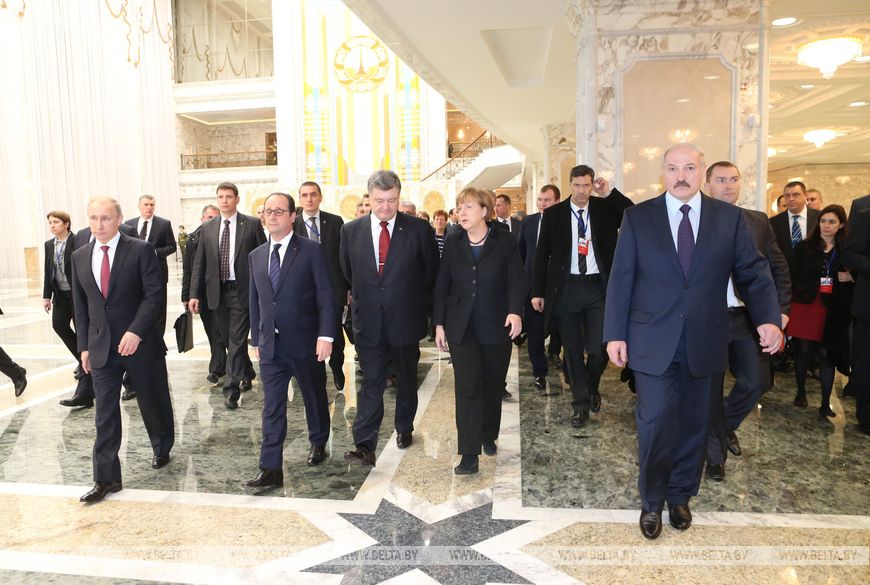
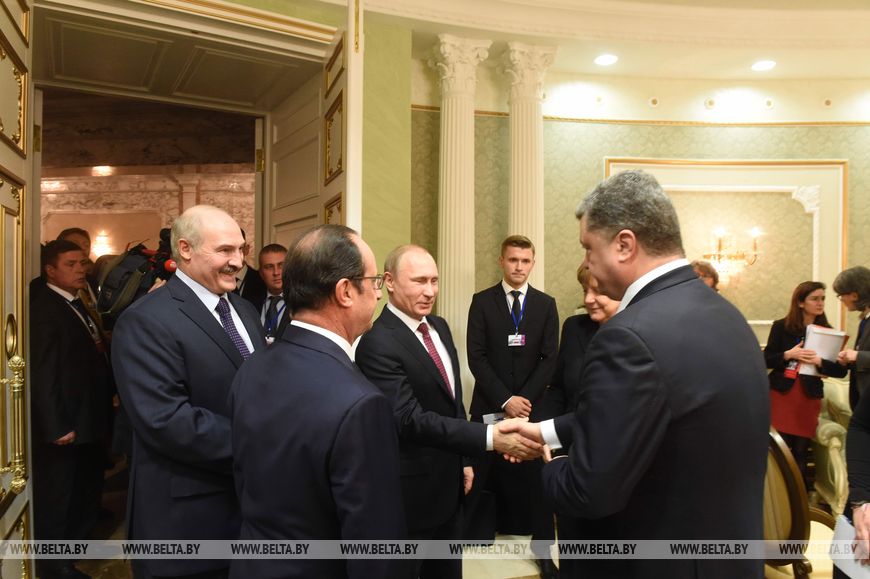
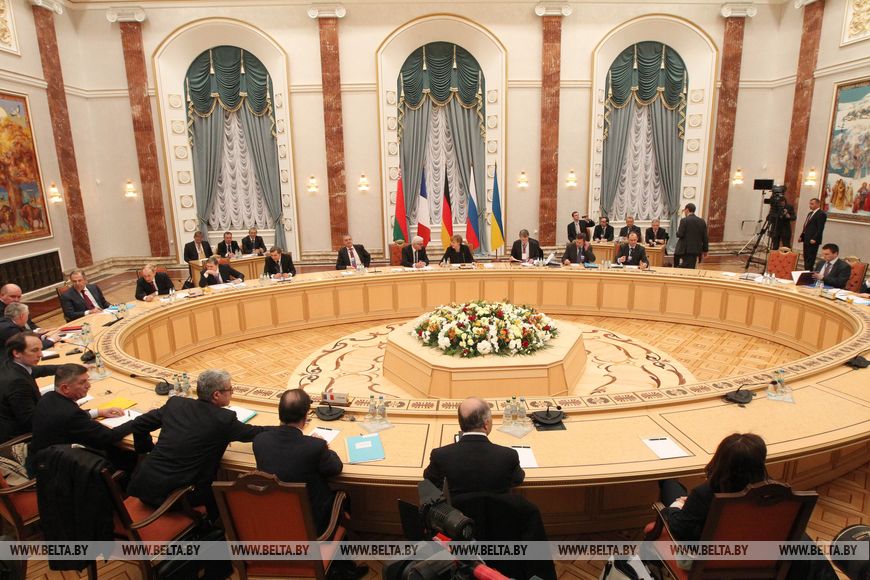
Just three days before the meeting in Minsk, Russian President Vladimir Putin held a telephone conference with the participants of the Normandy Four. The Russian leader shared the details with Belarusian President Aleksandr Lukashenko, who was on a visit to Sochi. Minsk was proposed as a venue for the talks on the settlement in Donbass.

"We have agreed that we will try to organize a meeting in this format in Minsk. It can be held as early as Wednesday if we manage to agree on a number of positions, which we have been intensively discussing recently," Vladimir Putin said and asked the Belarusian leader to help organize the meeting.
"I assure you that for the sake of peace in our common home (after all, people in Donetsk, Donbass, Ukraine are no strangers to us) Belarus will do everything to help settle the situation, in which they have found themselves," Aleksandr Lukashenko noted.
Those were not just words. In September 2014, Minsk hosted the trilateral contact group for a peaceful settlement in eastern Ukraine. Authorized representatives of Ukraine, the OSCE and Russia signed a document on a ceasefire in south-eastern Ukraine, the so-called Minsk Protocol. We talked about this in one of the episodes of the How it Was project. By the time of the Normandy Four leaders' meeting, we already had experience of such events.
‘The eyes of the whole world are on Minsk’. What Poroshenko said about the Normandy Four meeting
The Palace of Independence was really overcrowded on 11 February 2015. A huge number of photo and video cameras and dozens of journalists were waiting for the arrival of the leaders of the Normandy Four. Minsk was indeed at the center of the world's attention.


Ukrainian leader Petro Poroshenko, who was the first to arrive at the palace for the talks, shared the same opinion. Upon arrival he was welcomed by Aleksandr Lukashenko. The presidents managed to hold a short meeting before the talks began.
"I am convinced that today the whole world has its eyes on Minsk. I think the Normandy format has never seen such a number of cameras, such international interest. I think it is very symbolic that this meeting is taking place in Minsk," Petro Poroshenko said. “Today the peace process in Ukraine is linked to the Minsk Protocol of 5 September, to the Minsk Memorandum of 19 September. I am keeping my fingers crossed so that today's date goes down in the history of world diplomacy as the achievement of the agreements on peace. I would like to emphasize that you have done everything possible to organize this meeting.”
"I am convinced that today the whole world has its eyes on Minsk. I think the Normandy format has never seen such a number of cameras, such international interest. I think it is very symbolic that this meeting is taking place in Minsk," Petro Poroshenko said. “Today the peace process in Ukraine is linked to the Minsk Protocol of 5 September, to the Minsk Memorandum of 19 September. I am keeping my fingers crossed so that today's date goes down in the history of world diplomacy as the achievement of the agreements on peace. I would like to emphasize that you have done everything possible to organize this meeting.”

Aleksandr Lukashenko thanked his Ukrainian counterpart for his trust in Belarus and the Belarusian people. The Belarusian leader assured Petro Poroshenko that Belarus would do everything for peace in Ukraine. Both our country and our president would later confirm these words with concrete actions.

How the Green Hall became one of the most iconic places of the Palace of Independence
German Chancellor Angela Merkel and French President Francois Hollande arrived at the Palace of Independence together. They were greeted by Aleksandr Lukashenko. The Belarusian president gave Angela Merkel a bouquet of flowers as a token of hospitality and politeness.
 Vladimir Putin arrived after the leaders of Germany and France. Before meeting with him, Aleksandr Lukashenko talked with Russian Foreign Minister Sergey Lavrov. The conversation was quite animated, although its details remained obscure. By the way, the Belarusian head of state also had a private conversation with his Russian counterpart.
Vladimir Putin arrived after the leaders of Germany and France. Before meeting with him, Aleksandr Lukashenko talked with Russian Foreign Minister Sergey Lavrov. The conversation was quite animated, although its details remained obscure. By the way, the Belarusian head of state also had a private conversation with his Russian counterpart.
 The leaders of the Normandy Four headed to the Green Hall of the Palace of Independence followed by a limited number of cameras. There, the heads of state exchanged handshakes - even Vladimir Putin and Petro Poroshenko, albeit after a short pause.
The leaders of the Normandy Four headed to the Green Hall of the Palace of Independence followed by a limited number of cameras. There, the heads of state exchanged handshakes - even Vladimir Putin and Petro Poroshenko, albeit after a short pause.


Later, the Green Hall became one of the most iconic and popular venues of the Palace of Independence. No wonder as it was there that the negotiations on a ceasefire in eastern Ukraine began. The talks were held in a very humble setting - the heads of state sat at a small table in the Green Hall.
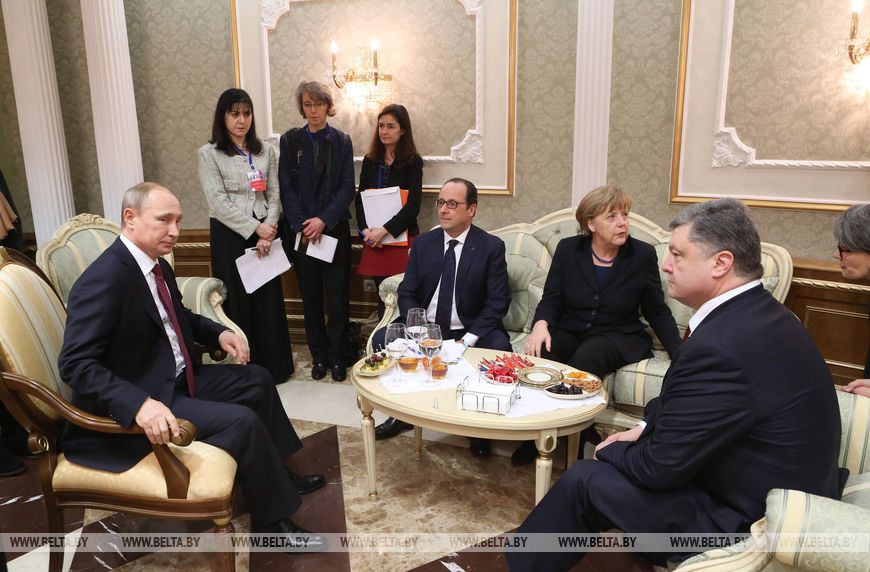

The journalists waited for the end of the talks in the corridors of the Palace of Independence. It was clear that issues of war and peace could not be resolved in an hour or two. The negotiations lasted for 17 hours! The leaders of the Normandy Four had never communicated for so long before. After some time, the heads of state, followed by a huge chain of journalists, moved to the small negotiating room for expanded talks.
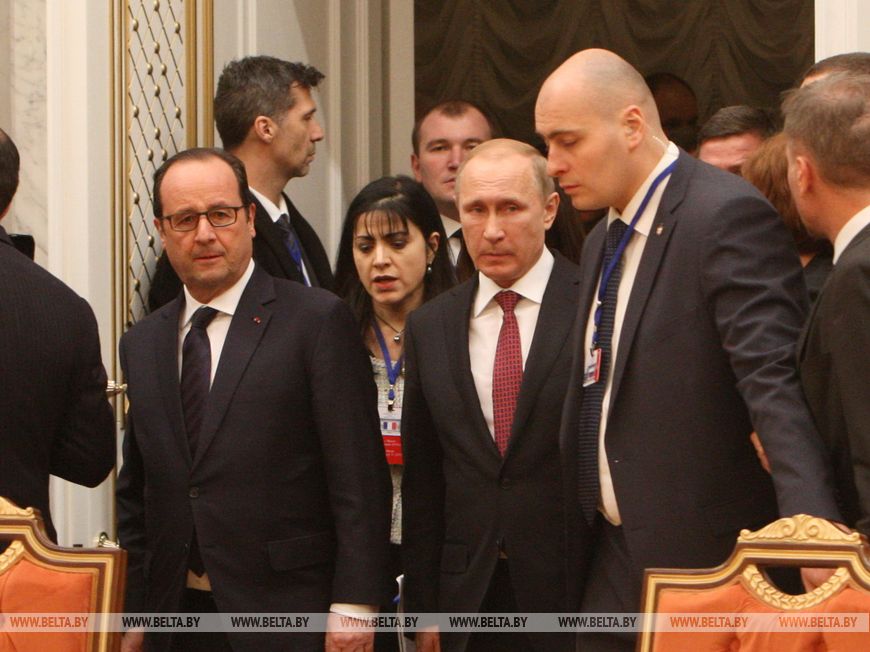
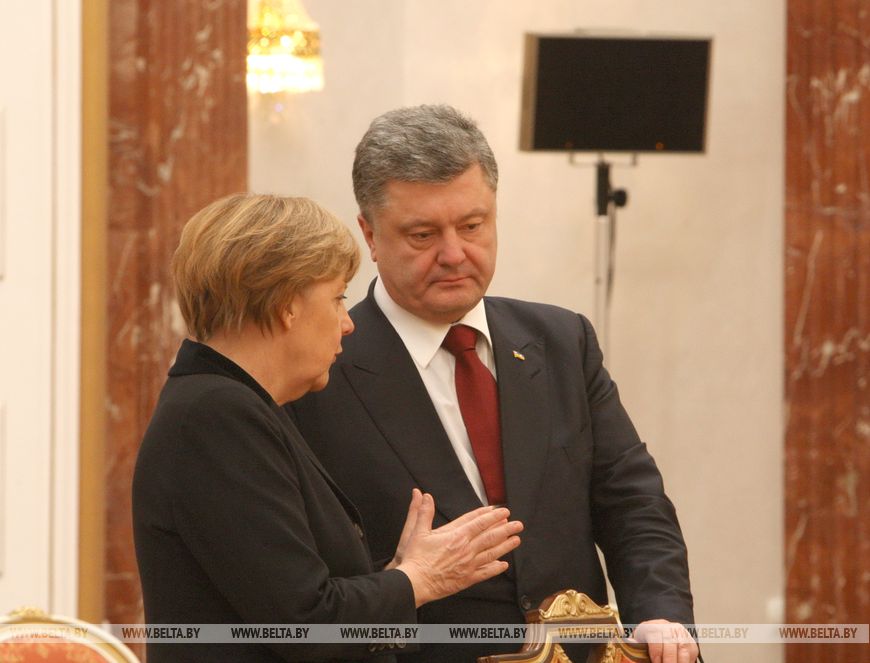



‘We have come to terms on the key issue.’ What Putin told journalists after the talks
"This is not the best night of my life, but the morning is good, in my opinion. Despite all the stumbling blocks, we managed to agree on the fundamental issue. Why did the process take so long? I think this is due to the fact that, unfortunately, the Kiev authorities still refuse to engage in direct talks with representatives of the people's republics of Donetsk and Lugansk," Vladimir Putin told journalists following the talks. "Although these republics are unrecognized, we must proceed from the reality on the ground. And if we want to achieve sustainable results, it is necessary to embark on direct contacts. But we had to operate in the conditions that we were put in and I think that we agreed on a lot."
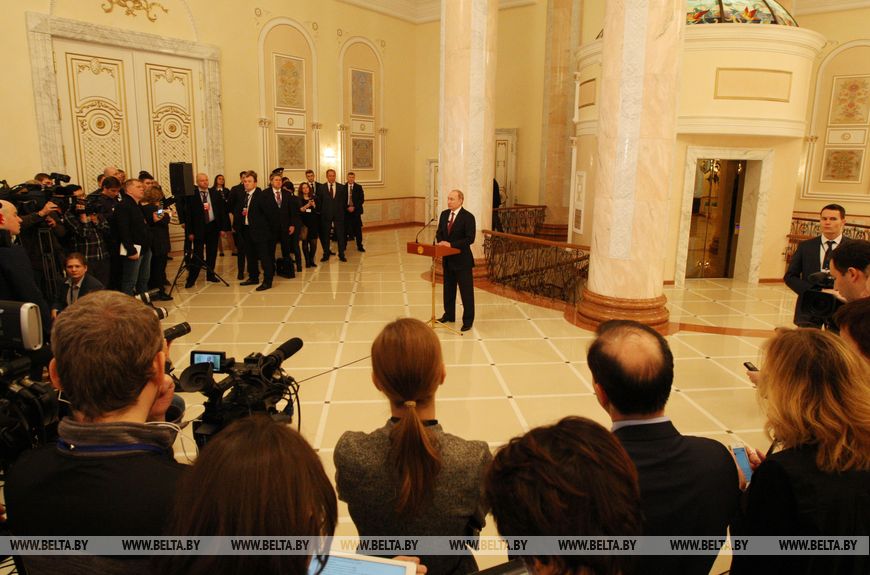
The Russian president informed that an agreement was reached to introduce a ceasefire at 00:00 on 15 February. Another important agreement concerned the withdrawal of heavy weapons from the line of contact for Ukrainian troops and the line designated in the Minsk agreements of 19 September 2014 for the Donbass militia. A long-term political settlement was also discussed.
"A number of things are at play. The first one is constitutional reform that should take into account the legal rights of people living in the territory of Donbass. Next come border issues that should be resolved jointly with the Donbass militia. There are also humanitarian matters and implementation of the law on the special status of Donetsk and Lugansk territories. The last, but not the least are economic and humanitarian issues," Vladimir Putin emphasized.
The Russian leader called on the parties to the conflict to exercise restraint and to make sure that the withdrawal of troops and heavy weapons takes place without unnecessary bloodshed.
‘This initiative was worth the effort.’ What Merkel and Hollande said about the Minsk agreements in 2015
Angela Merkel and François Hollande were tight-lipped, but they did make brief statements for the press. The French president emphasized that the conflict resolution encompassed a number of elements. He highlighted the great efforts made by the presidents of Russia and Ukraine to ensure that the parties could reach an agreement.

“We still hope to resolve the conflict. The way out of the crisis lies in strict compliance with the Minsk agreements. There is no doubt that we need to take steps to resolve the conflict as soon as possible. And we still have many serious problems to tackle. But I can say that following today's meeting we have much more reasons to be hopeful about a resolution to the crisis than we did before the meeting. So we can say that this initiative was worth the effort,” Angela Merkel said.
“The way out of the crisis lies in strict compliance with the Minsk agreements”. Would someone remind the former German chancellor of these words nowadays? After all, her recent “revelations” about the Minsk agreements contradict what she said immediately after the negotiations. We are not here to judge which of her words were more sincere. Although there is a strong feeling that Angela Merkel, François Hollande and Petro Poroshenko took the Normandy Four meeting extremely seriously. The 17-hour talks simply could not be an attempt to buy time for the Ukrainian army, which suffered defeats in Donbass.
‘War and peace issues take months or even years to resolve’. How Lukashenko assessed the Normandy Four meeting
After the leaders of the Normandy Four left the Palace of Independence, Aleksandr Lukashenko answered the journalists' questions. The president acknowledged the great attention to our country and emphasized that it was not the main thing. “I am glad that such serious issues have been tackled here at such a high level. War and peace issues are the hardest ones. Journalists said that the negotiations took a long time, 15 hours... But it was worth it. Negotiations take a long time, but sometimes they last for 24 hours, even for months and years,” the head of state said.

In another conversation with journalists, the president admitted that he was very satisfied with the negotiations. “I am happy that Belarus has fulfilled its functions, its role (you probably agree with me). But the main players have already answered all your questions. They were, certainly, the heads of state. They did a great job. They endured this 'marathon'. But I repeat once again: Do not exaggerate the fact that these negotiations proceeded for so long. Issues of war and peace take months or even years to resolve,” Aleksandr Lukashenko emphasized.
The Belarusian leader also praised the work of journalists: “They are very organized people. There was no fuss, which surprised me. They all are from different countries, but they found a common language very quickly and professionally. I congratulate you on that!" Certainly, the president did not forget about hospitality and promised to give everyone coffee.
When asked whether he was eager to build relations with the West in the same way as with Russia, Aleksandr Lukashenko said: “You know, I would not say that we have improved relations with them. I do not have false hopes. I would like to say it fair and square (thank you for asking this question): I am too old to make hasty decisions and so on."
“I am a seasoned politician (pardon my immodesty) with a wealth of experience under by belt. It is not new to me, and to you, either. I have seen all kinds of negotiations. Did I lose my cool knowing that it would be a make-or-break meeting? Why would I? I was asked to arrange this event and I am not exaggerating the role of Belarus and my personal role here. As usual, I am not going to exaggerate,” the head of state emphasized. "So if you think that it is a reason for me to change direction, forget about it. First of all, it is never going to happen. Secondly, frankly speaking, I am not invited and not welcome there. And thirdly, we are Russian people, after all! Listen, what are we talking about? We are people born on the same land. We have a common history, common views. Perhaps it is also important that we are friends with the president of Russia. Not only brothers, but also friends. That is what you should proceed from."
"This is not the best night of my life, but the morning is good, in my opinion. Despite all the stumbling blocks, we managed to agree on the fundamental issue. Why did the process take so long? I think this is due to the fact that, unfortunately, the Kiev authorities still refuse to engage in direct talks with representatives of the people's republics of Donetsk and Lugansk," Vladimir Putin told journalists following the talks. "Although these republics are unrecognized, we must proceed from the reality on the ground. And if we want to achieve sustainable results, it is necessary to embark on direct contacts. But we had to operate in the conditions that we were put in and I think that we agreed on a lot."

The Russian president informed that an agreement was reached to introduce a ceasefire at 00:00 on 15 February. Another important agreement concerned the withdrawal of heavy weapons from the line of contact for Ukrainian troops and the line designated in the Minsk agreements of 19 September 2014 for the Donbass militia. A long-term political settlement was also discussed.
"A number of things are at play. The first one is constitutional reform that should take into account the legal rights of people living in the territory of Donbass. Next come border issues that should be resolved jointly with the Donbass militia. There are also humanitarian matters and implementation of the law on the special status of Donetsk and Lugansk territories. The last, but not the least are economic and humanitarian issues," Vladimir Putin emphasized.
The Russian leader called on the parties to the conflict to exercise restraint and to make sure that the withdrawal of troops and heavy weapons takes place without unnecessary bloodshed.
‘This initiative was worth the effort.’ What Merkel and Hollande said about the Minsk agreements in 2015
Angela Merkel and François Hollande were tight-lipped, but they did make brief statements for the press. The French president emphasized that the conflict resolution encompassed a number of elements. He highlighted the great efforts made by the presidents of Russia and Ukraine to ensure that the parties could reach an agreement.

“We still hope to resolve the conflict. The way out of the crisis lies in strict compliance with the Minsk agreements. There is no doubt that we need to take steps to resolve the conflict as soon as possible. And we still have many serious problems to tackle. But I can say that following today's meeting we have much more reasons to be hopeful about a resolution to the crisis than we did before the meeting. So we can say that this initiative was worth the effort,” Angela Merkel said.
“The way out of the crisis lies in strict compliance with the Minsk agreements”. Would someone remind the former German chancellor of these words nowadays? After all, her recent “revelations” about the Minsk agreements contradict what she said immediately after the negotiations. We are not here to judge which of her words were more sincere. Although there is a strong feeling that Angela Merkel, François Hollande and Petro Poroshenko took the Normandy Four meeting extremely seriously. The 17-hour talks simply could not be an attempt to buy time for the Ukrainian army, which suffered defeats in Donbass.
‘War and peace issues take months or even years to resolve’. How Lukashenko assessed the Normandy Four meeting
After the leaders of the Normandy Four left the Palace of Independence, Aleksandr Lukashenko answered the journalists' questions. The president acknowledged the great attention to our country and emphasized that it was not the main thing. “I am glad that such serious issues have been tackled here at such a high level. War and peace issues are the hardest ones. Journalists said that the negotiations took a long time, 15 hours... But it was worth it. Negotiations take a long time, but sometimes they last for 24 hours, even for months and years,” the head of state said.

In another conversation with journalists, the president admitted that he was very satisfied with the negotiations. “I am happy that Belarus has fulfilled its functions, its role (you probably agree with me). But the main players have already answered all your questions. They were, certainly, the heads of state. They did a great job. They endured this 'marathon'. But I repeat once again: Do not exaggerate the fact that these negotiations proceeded for so long. Issues of war and peace take months or even years to resolve,” Aleksandr Lukashenko emphasized.
The Belarusian leader also praised the work of journalists: “They are very organized people. There was no fuss, which surprised me. They all are from different countries, but they found a common language very quickly and professionally. I congratulate you on that!" Certainly, the president did not forget about hospitality and promised to give everyone coffee.
When asked whether he was eager to build relations with the West in the same way as with Russia, Aleksandr Lukashenko said: “You know, I would not say that we have improved relations with them. I do not have false hopes. I would like to say it fair and square (thank you for asking this question): I am too old to make hasty decisions and so on."
“I am a seasoned politician (pardon my immodesty) with a wealth of experience under by belt. It is not new to me, and to you, either. I have seen all kinds of negotiations. Did I lose my cool knowing that it would be a make-or-break meeting? Why would I? I was asked to arrange this event and I am not exaggerating the role of Belarus and my personal role here. As usual, I am not going to exaggerate,” the head of state emphasized. "So if you think that it is a reason for me to change direction, forget about it. First of all, it is never going to happen. Secondly, frankly speaking, I am not invited and not welcome there. And thirdly, we are Russian people, after all! Listen, what are we talking about? We are people born on the same land. We have a common history, common views. Perhaps it is also important that we are friends with the president of Russia. Not only brothers, but also friends. That is what you should proceed from."




